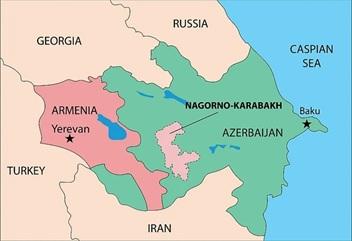Senator Marco Rubio Highlights Growing Azerbaijan-Armenia Conflict Risks in the South Caucasus
Rising Tensions Prompt Urgent Calls for Diplomatic Action
U.S. Senator Marco Rubio has recently expressed serious concerns over the escalating discord between Azerbaijan and Armenia in the strategically vital South Caucasus region. During a Senate briefing, Rubio emphasized the urgent need for diplomatic engagement to prevent an outbreak of armed hostilities. He pointed to unresolved territorial disputes‚ÄĒparticularly over Nagorno-Karabakh‚ÄĒand competition for regional resources as primary catalysts driving instability.
Rubio also underscored how entrenched historical animosities continue to exacerbate tensions, warning that any renewed conflict could draw neighboring powers into a broader confrontation and disrupt critical energy supply routes that feed European markets. His remarks highlight not only local humanitarian risks but also significant geopolitical implications affecting global security dynamics.
The United States’ Role: Advancing Peace Through Collaborative Diplomacy
In light of these developments, U.S. policymakers are intensifying efforts to stabilize this volatile area by promoting multilateral dialogue and peacebuilding initiatives. Senator Rubio advocates for an inclusive approach involving international stakeholders such as the OSCE Minsk Group, Russia, Turkey, and European partners to facilitate constructive negotiations between Baku and Yerevan.
This strategy encompasses expanding humanitarian assistance aimed at communities still recovering from previous conflicts while addressing fundamental issues like minority rights protections and economic revitalization within both countries. The U.S. remains committed to preventing another devastating war reminiscent of past clashes that have left lasting scars on regional societies.
Key Diplomatic Measures Targeting Conflict De-escalation
The United States is deploying several targeted diplomatic tools designed to ease tensions in the South Caucasus:
- Bilateral Dialogue Facilitation: Promoting direct communication channels between Azerbaijani and Armenian officials aimed at rebuilding mutual trust through regular high-level meetings.
- International Mediation Support: Collaborating with entities like the OSCE Minsk Group to monitor ceasefire compliance impartially and mediate ongoing disputes effectively.
- Regional Security Partnerships: Engaging neighboring countries such as Georgia and Turkey in joint security frameworks intended to foster stability across borders.
Apart from diplomatic efforts, economic incentives are being explored as leverage points encouraging peaceful behavior‚ÄĒfor example, trade facilitation agreements or infrastructure investments designed to create interdependencies that reduce motivations for conflict escalation.
| Diplomatic Initiative | Description |
|---|---|
| Bilateral Forums | Sustained dialogues fostering transparency among leadership teams on both sides. |
| Security Sector Reform Assistance | Supporting reforms within defense institutions aimed at increasing accountability and reducing militarization risks. |
| Cultural Exchange Programs | Cultivating grassroots connections through educational exchanges designed to challenge stereotypes and build empathy among populations. |
>
>
< > >As U.S officials warn about heightened chances of renewed violence between Azerbaijan and Armenia, experts advocate stronger multilateral involvement as essential for sustainable peace-building efforts.< / p>> <
<>Global Analysts Stress Enhanced International Engagement<
<>
<
<
<
<< / ul>>
<< p >> Robust monitoring mechanisms backed by international organizations will be critical in ensuring adherence to agreements reached during negotiations‚ÄĒstrengthening accountability necessary for durable peace.< / p >>
<< table class="wp-block-table" >>
n
n
n
n
n
n
n
< br />< br />
>
>
A Vision Toward Lasting Stability: Concluding Insights
The recent warnings issued by Senator Marco Rubio underscore Washington‚Äôs firm commitment toward preventing further violence amid rising instability along this crucial Eurasian corridor connecting Europe with Asia‚Äôs energy resources. Renewed fighting would jeopardize civilian lives while threatening vital pipelines supplying natural gas across Europe ‚ÄĒ highlighting why proactive diplomacy remains indispensable today more than ever before.
The United States‚Äô comprehensive approach combines sustained mediation efforts with humanitarian aid alongside strategic economic incentives‚ÄĒall geared toward nurturing reconciliation rather than merely securing fragile ceasefires alone. As international actors remain vigilant, cautious optimism persists that persistent cooperation can ultimately pave a pathway toward enduring peace within one of Eurasia‚Äôs most historically contested regions.
















